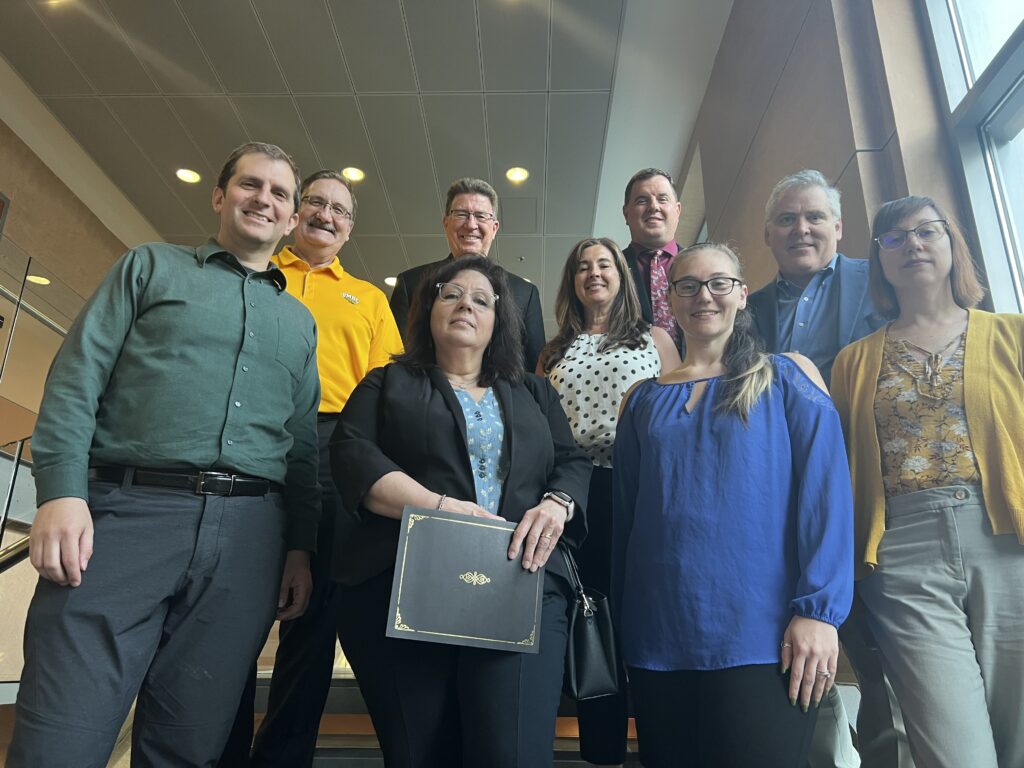Institutionally Supported Effort Reporting to NSF Higher Education Research & Development (HERD) Survey
Institutionally Supported Effort Reporting to NSF Higher Education Research & Development (HERD) Survey project was selected for the Spring 2024 Job Well Done Group Project Award. The project group was nominated by Karl Steiner, Vice President for Research & Creative Achievement and Kathy Dettloff, Vice President for Administration and Finance.
This was a complex, multi-unit project, based on the initial concept developed by Dr. Don Engel, which required close communication and partnership among multiple colleagues from the Departments of Financial Accounting & Reporting, Contract & Grant Accounting, Cost Accounting & Analysis, and from the Office for Research & Creative Achievement (RCA).
The team consisted of Joanna Napoli, Amy Steinly-Marks, Dean Drake, Michael Walsh, Rebecca O’Brien, Jennifer Kelly, Don Engel and Bryan Casey.
The HERD Survey is the primary source of information on research and development expenditures at U.S. colleges and universities. The survey collects information on expenditures, broken out by discipline and source of funds, and also gathers information on activity types and headcounts.
Academic institutions across the country are using the data submitted to the HERD Survey to track progress and compare their standings relative to other institutions. More importantly, the HERD Survey provides one of the key metrics for the Carnegie Classification of Institutions of Higher Education – the leading framework for recognizing and categorizing scholarly activity in U.S. higher education – which reclassified UMBC in 2021/22 as a Research 1 (R1) Doctoral Institution, one of only 146 institutions in the Nation in this top category and one of only three institutions in Maryland.
We have known for several years that UMBC was significantly underreporting a key component of the Annual HERD Survey, the portion describing significant investment into faculty salaries covering faculty time used for Research & Creative Achievement (RCA) activities, which are counted under the header “Institutional Funds.”
Between 2012 and 2021, UMBC’s external grants and contracts grew by 46%, while the institutional funds contributions reported to the HERD Survey dropped by 49% during the same time period. This situation has put not only UMBC at a significant disadvantage, since we have not fully reported the true effort of the RCA community, but it has also under-represented the overall USM efforts in research, and the annual investments by the State into the UMBC faculty. It also put us in the unfortunate position of underrepresenting the proportion of scholarly activities being conducted within those UMBC departments which have, due to the availability of funding sources on a national level, less opportunity for significant extramural funding.
After several years of unsuccessful attempts to resolve this issue, I am proud to report that for the first time, due the efforts outlined in this nomination, UMBC has created a methodology to track faculty effort dedicated to RCA initiatives, and we have submitted a full accounting of the true RCA efforts among our UMBC community.
The efforts have led to an immediate $17M increase in our total reporting to NSF and raised our earlier projection for FY 2022 from $93M to an all-time record exceeding $110M – reflecting a prior under-reporting of 18%. Reportable non-STEM expenditures, a key component of the Carnegie research classifications, increased by 3.5 times over the prior year’s total, from $2.8M March 2023 in FY 2021 to $9.6M in FY 2022.
The methodologies and campus-wide effort that enabled this initiative required close collaboration between several units on our campus – especially the Office of Contract & Grant Accounting and the Office for Research & Creative Achievement, in particular the Office of Sponsored Programs.
The impact of this work on our institution cannot be over-emphasized. As UMBC continues to evolve as an academic institution, and as a research institution within a highly competitive state and region, it is vital for the continued growth of UMBC to fully capture all of the resources and efforts committed by the members in our UMBC community. This effort is correcting a long-term oversight, which until now has been seen as too complex to be solved. In prior years the significant impact of this initiative was also not widely understood and underestimated.
Going forward, future faculty applicants and academic leaders, who frequently review the NSF HERD rankings when reviewing institutions for potential employment opportunities, will get a more complete picture of the true impact of RCA across our campus. The maintenance of our institutional Research R1 status as a result of this corrected reporting will help with recruitment of faculty, but also of students, in particular graduate students, to UMBC.
